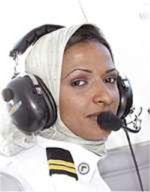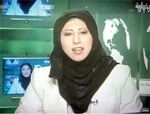|
Remarks made in Houston, Texas, on May 13, 2005 by Princess Lolowah Al-Faisal, Vice-Chair of the Board of Trustees and General Supervisor of Effat College as part of the
2005 Saudi Arabia Trade Mission organized by the
Committee of International Trade of the Saudi Council of Chambers of Commerce and
Industry.
HRH Lolowah Al-Faisal
2005 Saudi Trade Mission
Houston, Texas
May 13, 2005
Good afternoon ladies and gentlemen. It�s a great pleasure to be here with you today and to talk to you about the business and investment opportunities in the Kingdom.
The meetings that HRH Prince Abdullah had with President Bush and his Cabinet during his recent visit to the United States have not only energized the mutual relations between our two nations but also reassured the world that Saudi Arabia will secure the adequate supply of energy to the world market.
during his recent visit to the United States have not only energized the mutual relations between our two nations but also reassured the world that Saudi Arabia will secure the adequate supply of energy to the world market.
The scale and speed of transformation in the country itself undoubtedly will play an important role in the dynamics of change and development in the world economy.
As the private sector increasingly regards the U.S. market as a comprehensive commercial entity, the Saudi government is developing policies and institutions, which reflect these deeper economic ties. This is especially true today not only for the energy sector but all sectors in the Saudi economy.
The historic ties between us and the state of Texas for many years will reinforce our shared trade initiatives and create unique opportunities for doing business together. And so as we celebrate this trade mission forum in Houston, let me pay tribute to this significant bilateral trade between the great state of Texas and Saudi Arabia. We have both grown and flourished together. This will certainly be emblematic of the larger partnership between Saudi Arabia and the United States.
The Saudi government has taken action on economic reform. In order to move the structure to a completely new level of efficiency, the Government created a series of economic institutions:
-
The
ministerial petroleum committee, which ensures our long-term
goals of oil price stability are acted upon.
-
The
High Commission on Tourism, which is opening the country to
foreign visitors.
-
The
General Investment Authority, which is a one-stop-shop for
foreign investors.
-
The
Supreme Economic Council, which has taken the bit firmly between
its teeth and continues to fast-track transparency, equality and
diversification. For instance, the Kingdom�s new
foreign investment code gives foreign investors the same
incentives as Saudis. Foreigners can own real
estate. Foreign companies can qualify for soft government
loans and own 100% of projects. There are more attractive
tax rates on foreign business profits.
-
This
goes hand in hand with Saudi
admission to the World Trade Organization (WTO),
which would be a watershed in market liberalization. In
gaining admission, an entire basket of trade incentives would
ensue including lower tariffs, negation of tax differentials and
increased market access to the financial and communication
sectors.
-
Moreover,
the Supreme Economic Council is focusing our energies on
privatization in order to encourage new investment.
Sectors now open to privatization include telecommunications,
civil aviation, desalination, highway management, railways, and
many more. For instance: The high-level Health Service Council
is being formed to prepare a strategy for health care
privatization. It is anticipated that some state-run
hospitals will be sold or rented to the private sector in order
to improve services and efficiency.
As a result, Saudi Arabia has maintained a positive trade balance, curtailed its budget deficits and kept inflation at bay. The gross domestic product (GDP) for 2004 was U.S. $248.5 billion in current prices. The GDP real growth was at 5.3%. These policies will help a great deal to meet the economic boom that is expected with the increase in oil production within the next 10 years. its budget deficits and kept inflation at bay. The gross domestic product (GDP) for 2004 was U.S. $248.5 billion in current prices. The GDP real growth was at 5.3%. These policies will help a great deal to meet the economic boom that is expected with the increase in oil production within the next 10 years.
The tremendous annual increase of female graduates that outnumbered male graduates for the past 10 years, as well as the opening of new positions for women in the market pushed for more expansion of the role
 of the woman in the society in general and in business in particular. It is clear, however, that the expansion of the population, which caused more economic pressures, made more women choose to establish their own businesses instead of staying at home. In fact, the recent influences such as satellites and internet services that come from different parts of the world increased awareness and made people want to improve their standard of living by a second income in the family. This played a major role in the demand for more job opportunities for females. Based on this, the Council of Ministers � the highest government body in the Kingdom � recently issued a nine-point plan urging the creation of more job of the woman in the society in general and in business in particular. It is clear, however, that the expansion of the population, which caused more economic pressures, made more women choose to establish their own businesses instead of staying at home. In fact, the recent influences such as satellites and internet services that come from different parts of the world increased awareness and made people want to improve their standard of living by a second income in the family. This played a major role in the demand for more job opportunities for females. Based on this, the Council of Ministers � the highest government body in the Kingdom � recently issued a nine-point plan urging the creation of more job opportunities for women. They lifted a ban that kept women from jobs in most fields. The Cabinet has instructed the ministries and government agencies to create jobs for women, and asked the Chambers of Commerce and Industry to form a committee for women to help train and secure jobs for them in the private sector. It also allocated land for the establishment of industrial projects to employ women. These new policies encouraged women to invest in the market which in turn helped boost the Saudi economy. opportunities for women. They lifted a ban that kept women from jobs in most fields. The Cabinet has instructed the ministries and government agencies to create jobs for women, and asked the Chambers of Commerce and Industry to form a committee for women to help train and secure jobs for them in the private sector. It also allocated land for the establishment of industrial projects to employ women. These new policies encouraged women to invest in the market which in turn helped boost the Saudi economy.
Today the cooperation between the Committee for the Development of International Trade of the Council of Saudi Chambers of Commerce and
Industry, and the U.S. Departments of Commerce and Energy and the National Association of Manufacturers, will mark another turning point in U.S.-Saudi relations. This trade mission will offer an opportunity to enhance, strengthen and continue to build further upon mutual commercial strengths. More than $623 billion in market opportunities are projected for the Saudi economy through the year 2020. It exists in different sectors starting from electricity, water, telecommunications, infrastructure, petrochemicals, natural gas, agriculture, information technologies, to tourism and education. Saudi businessmen have already provided you with detailed information on export market growth potential and business opportunities for each of these sectors.
These are some of the most attractive features of the Saudi economy which is expected to witness solid and continuous growth in the coming years auguring well for a promising and bright future for Saudi and American businesses.
Finally, I would like to give a special thanks to our prime sponsors: Riyadh Chambers of Commerce and Industry, U.S. Embassy in Riyadh, the U.S. Departments of Commerce, the U.S. Department of Energy, the National Association of Manufacturers, Saudi Aramco, ChevronTexaco, and ExxonMobil which made this mission possible. My sincere thanks also goes to all honorable guests for being with us in this wonderful occasion.
���
Source: AboutSaudiArabia.net
|


